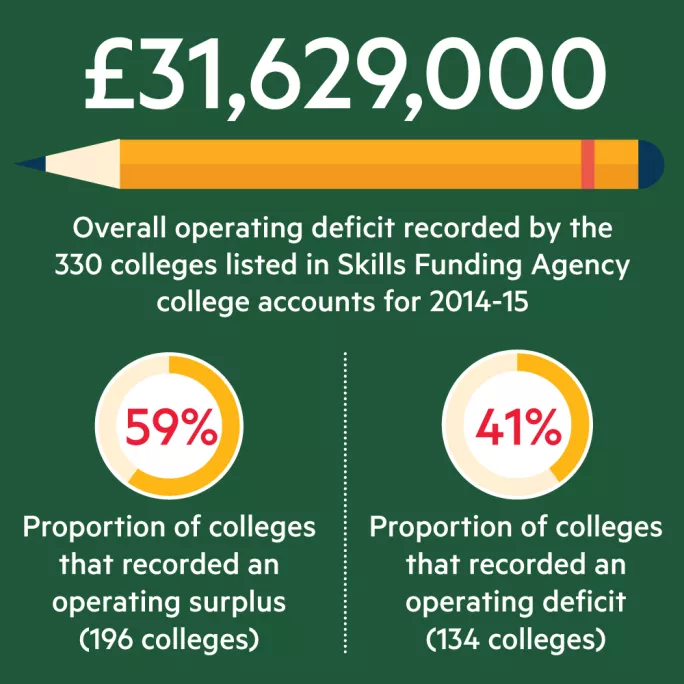
Colleges ‘will struggle’ to hit £500m surplus target

Colleges should aim to build up a collective surplus of as much as £500 million a year, according to the FE commissioner.
Sir David Collins has told sector leaders that colleges should hold an operating surplus of 3-5 per cent of their income. But analysis by TES reveals that, at present, fewer than a quarter of colleges would meet this target.
According to the most recent accounts, more than four in 10 colleges reported an operating deficit in 2014-15. In December, the Commons Public Accounts Select Committee warned that the sector’s financial health was “declining”, and that funding bodies had been “slow to address emerging financial and educational risks”.
The target of attaining an operating surplus of at least 3 per cent is one of a series of benchmarks outlined by the commissioner, with a view to securing the financial sustainability of colleges after the area reviews.
‘Arbitrary’ goal
The Association of Colleges (AoC) said it would be a “struggle” for colleges to hit the target, while the University and College Union (UCU) described the goal as “arbitrary” and counterproductive.
According to the official report of a meeting of the national area review advisory group, seen by TES, Sir David told FE representatives that if colleges met the target, “the sector could secure a surplus of £250 million per year at minimum, and possibly as much as £500 million”.

The area reviews also offered “scope for securing greater efficiency and delivering a stronger collaborative approach”, he said.
Accounts from the Skills Funding Agency, show that colleges collectively had an operating deficit of more than £31 million in 2014-15, with 134 colleges running at a deficit. Fewer than one in four (23 per cent) recorded a surplus of 3 per cent or more.
And the situation could deteriorate. In April, a survey of college principals carried out by the AoC, in partnership with TES, revealed that 16 per cent of colleges were planning to operate a deficit budget for 2016-17.
A spokesman for the UCU said the union had serious concerns about the “arbitrary guidelines”, adding: “This may be what [the commissioner] wanted to achieve, but he has missed the point that the year-on-year funding cuts are behind deficits.”
Ian Pretty, chief executive of the 157 Group of colleges, said setting a benchmark was “not without its challenges”. But he added: “There is nothing wrong with the principle of colleges creating operating surpluses or profit.
“As social enterprises, colleges should be actively encouraged to develop and then reinvest surpluses in the local community, especially in areas where traditional funding sources might no longer be available.”
The group’s member colleges were keen to explore opportunities for commercialisation and developing new income streams, he added.
Call for increased spending
Julian Gravatt, assistant chief executive of the AoC, said it would be a “real struggle” for all institutions to hit the benchmark. “Some colleges will be able to increase their income and surpluses through expansion and developing new apprenticeships and loan-funded courses,” he added. “But for the majority, improvements to their operating position will involve further cost cuts.
“At a time of economic uncertainty following the decision to leave the EU, it would be better for the government to increase spending on further education, and for colleges to increase spending on valuable courses to help people acquire new skills. Higher surpluses for the sector are a desirable longer-term goal but a better short-term priority might be an increase in collective investment.”
Higher surpluses for the sector are a desirable longer-term goal but a better short-term priority might be an increase in collective investment
Andy Wilson, chief executive of the WKCIC Group - created through the merger of Westminster Kingsway and City and Islington colleges in London - said the surplus would be attainable in the medium term only through mergers between financially sound colleges.
“However, as far as I can see, the area review process is not interested in bringing together sound colleges, only in finding partners to provide short-term support for those in financial difficulties,” he argued.
Mr Wilson added that even a financially stable college might prefer to “invest to secure its continued success rather than show a large surplus in its accounts”.
Apprenticeships and skills minister Robert Halfon said area reviews were focused on ensuring effective and financially sustainable colleges, adding: “Allowing colleges to achieve financial surpluses will not only ensure their sustainability, it will also enable them to reinvest, improving the quality for learners.”
You need a Tes subscription to read this article
Subscribe now to read this article and get other subscriber-only content:
- Unlimited access to all Tes magazine content
- Exclusive subscriber-only stories
- Award-winning email newsletters
- Unlimited access to all Tes magazine content
- Exclusive subscriber-only stories
- Award-winning email newsletters
You need a subscription to read this article
Subscribe now to read this article and get other subscriber-only content, including:
- Unlimited access to all Tes magazine content
- Exclusive subscriber-only stories
- Award-winning email newsletters
- Unlimited access to all Tes magazine content
- Exclusive subscriber-only stories
- Award-winning email newsletters